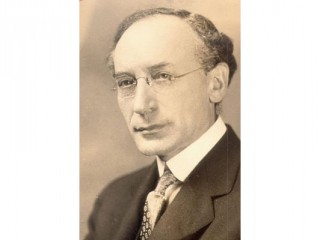
Morris Raphael Cohen biography
Date of birth : 1880-07-25
Date of death : 1947-01-28
Birthplace : Minsk, Russia
Nationality : Russian
Category : Famous Figures
Last modified : 2011-11-25
Credited as : philosopher, lawyer,
The American philosopher Morris Raphael Cohen distinguished himself as an expositor of the nature of a liberal society, as a teacher, and as a defender of academic freedom.
Morris R. Cohen was born probably on July 25, 1880, and spent his first years in a Jewish ghetto in Minsk, Russia. He early displayed a preference for the contemplative life. His education was that of an Orthodox Jew. In 1892 the family emigrated to New York, where, during the next 7 years, Cohen drifted away from organized religion and eventually gave up all belief in a personal God.
Cohen entered the College of the City of New York in 1895. His family's penurious, hand-to-mouth existence stimulated Cohen's interest in socialism. From his study of Marx and Hegel developed his earliest preoccupation with the technical aspects of philosophy. In 1898 he met Thomas Davidson, the Scottish scholar whose example would inspire Cohen throughout his life; under his tutelage Cohen read Aristotle, Plato, Hume, and Kant.
After graduating in 1900, Cohen continued his pursuit of philosophy, discovering in Bertrand Russell's Principles of Mathematics a "renewed faith" in logic. In 1904 the Ethical Culture Society awarded Cohen a fellowship to do graduate work at Harvard. Two years later, shortly after he completed his doctorate, he married Mary Ryshpan; they had three children.
Ensconced in the philosophy department of the College of the City of New York, Cohen came into his own as a teacher. Demanding of his students and responding sarcastically to careless thinking, he nonetheless drew overflow crowds of students and won great affection and respect. Outside the classroom he led the struggle to uphold academic freedom against authoritarian interference. He was one of the founding members of the American Association of University Professors. As a tide of anti-Semitism rose in the 1930s, he helped organize the Conference on Jewish Relations to study modern Jewry scientifically; he was also editor of its journal, Jewish Social Studies.
Meanwhile Cohen was writing scholarly articles and books. In 1923 his edition of C. S. Peirce's essays, Chance, Love and Logic, appeared. In 1931 in his most important work, Reason and Nature: An Essay on the Meaning of Scientific Method, he developed the concept that characterized all his thought and came closest to representing a metaphysical position. That concept, polarity, held that ideas such as "unity and plurality, similarity and difference, dependence and independence, form and matter, change and permanence" were "equally real," and "the way to get at the nature of things" was to "reason" from such "opposing considerations." Hence the necessity of society's tolerating conflicting points of view.
Ever since he had shared a room with Felix Frankfurter at Harvard, Cohen had indulged a lively interest in jurisprudence, which resulted in Law and the Social Order: Essays in Legal Philosophy (1933). He believed that logical reasoning was critically important to all fields of thought. An Introduction to Logic and Scientific Method (1934), written with a former student, Ernest Nagel, became a popular college textbook.
In 1938 Cohen left teaching to devote himself to writing. His Preface to Logic (1944) elucidated logic's place in the universe. Faith of a Liberal (1946) sought to rescue the term "liberal" from connotations of sentimentality. Cohen had already manifested his lifelong fascination with history by helping found the Journal of the History of Ideas. He selected the philosophy of history as his topic when the American Philosophical Association chose him to deliver its Carus Lectures, later published as The Meaning of Human History (1947).
Cohen died on Jan. 28, 1947. He left many works half finished, which his son Felix, a scholar in his own right, published: A Source Book in Greek Science (1948), A Dreamer's Journey (1949), Studies in Philosophy and Science (1949), Reflections of a Wondering Jew (1950), Reason and Law: Studies in Juristic Philosophy (1950), Readings in Jurisprudence and Legal Philosophy (1951), King Saul's Daughter: A Biblical Dialogue (1952), and American Thought: A Critical Sketch (1954). Cohen's publications stand as a positive statement of his faith in a liberal civilization and answer those critics who found in him only the sharp tongue of a nihilist.
















